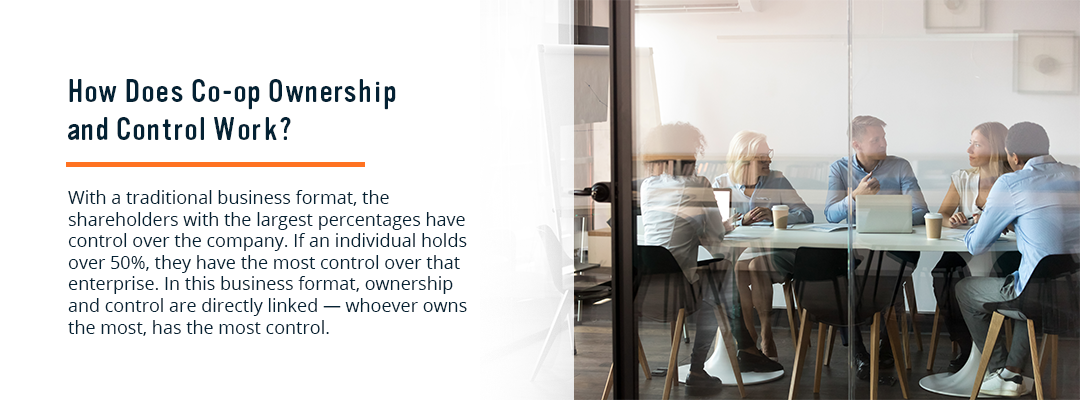One 2019 report found that, in the United States, only about 1% of families hold 40% of the nation’s wealth, while 90% of families hold less than one-quarter.
While there are many reasons for the poor distribution of wealth in the United States, one significant factor is our economic model. For-profit businesses overpower almost every industry in the world. Those who are lucky, wealthy or business-savvy enough to become a substantial shareholder of a large, successful for-profit company end up accumulating a significant amount of wealth.
However, it rarely ends there. Typically, they take that money and re-invest it into more businesses and end up receiving an even bigger fortune. At some point, many of these people have more money than they or their families could possibly spend in a lifetime — and yet, they continue to invest and own more companies. All the while, communities all over the country are struggling to keep their lights on or feed their children.
So how do we fix this?
We could rely on charitable donations from the people who caused the uneven wealth distribution in the first place. However, that involves relying on those people to choose your community as a “worthy cause,” and they would end up receiving significant tax breaks, securing their fortunes even more.
The best way to equitably spread wealth is to start on the community level. One way to accomplish this is with the cooperative business model. A cooperative business, or co-op, is an autonomous association of individuals who collectively and democratically owns and operates a business, with the intent to better serve their community.
What Is the Purpose of a Cooperative?
The primary purpose of a cooperative is to serve the community in which it operates. Since co-ops are not-for-profit enterprises, a majority of the profit goes towards fulfilling the social, economic and cultural needs of the community. When a co-op does well, it benefits the community as a whole.
A successful cooperative business can provide employment, investment opportunities, collaborative growth and even distribution of wealth, among other things. Co-ops are exclusively controlled by members who shop at and use the business regularly, so it will always exist to better its community. Since members of the community own and operate a cooperative business, they will always have the incentive to benefit one another. The members will want the co-op to help the community because they are a part of it — and the community will always want to support the co-op because it invests in the betterment of the community.
How Does Co-op Ownership and Control Work?

With a traditional business format, the shareholders with the largest percentages have control over the company. If an individual holds over 50%, they have the most control over that enterprise. In this business format, ownership and control are directly linked — whoever owns the most, has the most control.
With a cooperative business format, ownership and control are somewhat separate. When an individual joins a co-op, they contribute a certain amount of equity to the company. Equity varies from company to company, but the amount of goods or services that member buys typically determines how much equity they contribute. The more equity a member contributes, the more of the co-op they own.
In a traditional business, you wouldn’t need to invest in a company to purchase its goods or services, just as you wouldn’t need to be a customer of a company to invest in it. However, this is not true for cooperative businesses. In a co-op, you are required to be a customer of the company to invest in it. For most co-ops, you are also required to be a member to purchase any of the goods or services. While some allow non-investors and non-members to buy their goods and services, they will typically offer substantial discounts to their members.
In terms of control, the process is much different. In a traditional business model, each share is worth one vote, and investors can purchase as many as they need or want to gain a majority — and therefore, control the decisions of the company. However, in a cooperative, one member equals one vote. No matter how much equity you’ve invested in the company or how much of it you own, you still only have one vote when it comes to making company decisions.
The Advantages of Cooperative Societies and Business Models
There are several advantages of a cooperative business, especially considering all the good it does for the community, employees and members. In case you’re not already convinced, here’s a list of cooperative advantages:
1. Equal Status
One of the major strengths of a cooperative business is that each member holds equal power. When a member joins, they get the same amount of control over the decisions of the company, no matter how much capital they contribute. In a traditional business model, a small group of shareholders would make decisions about the company because they own the most shares — this is not the case in a cooperative business. Each member gets one vote, and whenever there is a surplus, each member receives some of their investment back.
2. Open Membership
Generally, the only criteria you have to meet to join a co-op is that you benefit from the service or product the company provides. Anyone can join a co-op, regardless of class, economic status, race or gender. As long as they can contribute to the company, whether it be in the form of capital or labor, they are eligible to join. There is also no maximum for the number of members a co-op can have, so it will only continue to grow.
3. Product and Service Access
Cooperative business focuses on access, rather than profit. One way they accomplish this is by providing access to goods or services in communities that wouldn’t otherwise have access. Co-ops sometimes offer a new product or service to their community, while other times they offer one that is simply of higher quality or more affordable. They also ensure that the profit created by the co-op gets invested back into the community and its members, rather than ending up in the pockets of a few shareholders.
4. Social Benefit
The primary purpose of a co-op is to serve the community in which it exists. In addition to providing goods and services, co-ops also serve as a beacon of good business. When a community invests, participates and supports a cooperative business, the rest of the community becomes stronger and equitably wealthier. Co-ops also often provide education and instruction for their members, employees and representatives so they can successfully contribute to the co-op and encourage them to spread information about co-ops beyond their communities.
5. Business Sustainability
Another example of the pros of cooperatives is their business stability and sustainability. The structure of a co-op is inherently more stable and resistant to common business blunders. Since there are more people making decisions in a co-op, they are less likely to make an impulsive decision that could potentially harm the company. The wide range of voices and opinions assures that they will explore every business option.
Plus, the people making the decisions about the co-op are members of the community in which it participates. It is, therefore, more likely that the members will decide to do whatever is in the best interest of the community, thus securing its future. Co-ops are also less dependent on consistent cash flow and investment. With other business models, if a significant amount of investors pull out of the business, it is likely to fail. With the cooperative business model, the cash flow and capital comes from a wide range of sources, so if a few fail, it won’t be devastating to the enterprise.
With a traditional business model, the death of a significant shareholder would open up a range of issues and paperwork to decide what will happen to that individual’s ownership. On the other hand, a cooperative business is legally considered a separate business entity, so it is not affected by the death of any of its members.
6. Easy Formation
It is much easier to form a cooperative business than it is to develop a traditional company. To start one, you only to gather ten members to form a steering committee, make sure your cooperative incorporates under the correct state statute, create a business plan, recruit some members, secure financing and open the doors.

7. Limited Liability
In a cooperative enterprise, members are liable only for the money they have invested in the co-op. They are not responsible for any debts or other liabilities of the company unless in the case of fraud or negligence. Even if the co-op were to fail, its members would only lose what they have already put into the company. They would not be responsible for paying any of the co-ops’ debts.
8. Less Taxation
Some of the largest co-op benefits lie within the tax code. Since co-ops are considered not-for-profit businesses, they receive several tax exemptions and concessions. A traditional business is double-taxed, meaning both the corporation has to pay taxes on its net earnings and its shareholders have to pay taxes on any income, or dividends, they receive from the company. While the members of a cooperative enterprise still have to pay taxes on their dividends, the co-op itself can take those dividends off their taxes as deductions.
9. State Assistance
Co-ops are crucial to the socio-economic development of the communities they serve, so states often offer them a range of loans, grants and financial assistance. There are also several foundations that help to fund, support and educate new and growing cooperative enterprises. Since the mission of many co-ops is to help communities and other co-ops stay afloat, there is no shortage of organizations that can help grow the cooperative movement.
How to Get Involved in Cooperative Development in Your Community
Whether you’re looking to join a cooperative business that already exists or start one of your own, there are endless ways to support cooperative development in your community. If you’re looking to invest in and join a pre-existing co-op, be sure to do your research to find the best one for you and your interests. The best co-ops are highly motivated to help their community and are eager to help other co-ops get up and running.
If you’re looking to start a new co-op, it’s essential to do your research and understand precisely what hoops you’ll have to jump through to make it a reality. You should be aware of any laws that might restrict your ability to start a co-op in your state. For example, Mississippi only allows agricultural or electrical co-ops.

The first thing you need to do is decide what type of cooperative business model will work best for what you’re trying to accomplish. Some common types of cooperatives are:
- Consumer co-ops: Consumer co-ops are owned by the customers who buy the products or services from the company. They allow the members to gain negotiation power, share earnings, supply their own needs and supply the needs of the community. These types of co-ops are common for food stores, retail stores and movie theaters.
- Worker co-ops: Worker co-ops are owned by the employees of the company. While they get paid for their labor like they would at a traditional company, they also own and control the company. While you can find worker co-ops in any industry, they are most common in the retail and service industries.
- Producer co-ops: Producer co-ops are owned by the producers that provide what the co-op sells. Producers usually form co-ops to increase their production and distribution speeds or to make their products more marketable. The most common type of producer cooperatives are agriculture co-ops.
- Purchasing co-ops: Purchasing co-ops are owned by several smaller enterprises that have banded together to create one business. These co-ops are typically formed to decrease the cost of production. Purchasing co-ops are also more likely to offer better deals to their customers because they can reduce the amount it costs to provide their product or service.

How to Get Started
While this might seem like a new concept, cooperative businesses have been around since the 1840s. While they have changed and developed since then, the primary purpose of the co-op has remained the same — to serve the community. They aren’t meant to make one person rich like most for-profit businesses. They are simply meant to redistribute the power and wealth to those who need it most. If you’re looking to get involved with the cooperative movement, the best way to start is by reaching out to an association that educates and supports co-ops.
The National Cooperative Business Association is dedicated to advocacy, education and opportunity for the entire cooperative movement across all sectors in the United States. The NCBA CLUSA mission is to protect, develop and advance cooperative enterprise.
At NCBA CLUSA, we support a more inclusive and equitable economy by empowering people to create a system of shared prosperity, improving the quality of life for themselves, their community and future generations. We are “the cooperative of cooperatives,” representing all types of cooperatives across a full range of sectors.
Keep browsing our website to learn more about co-ops and NCBA CLUSA and how we advocate for cooperatives around the world.
Contact us to learn more or become a member today.



